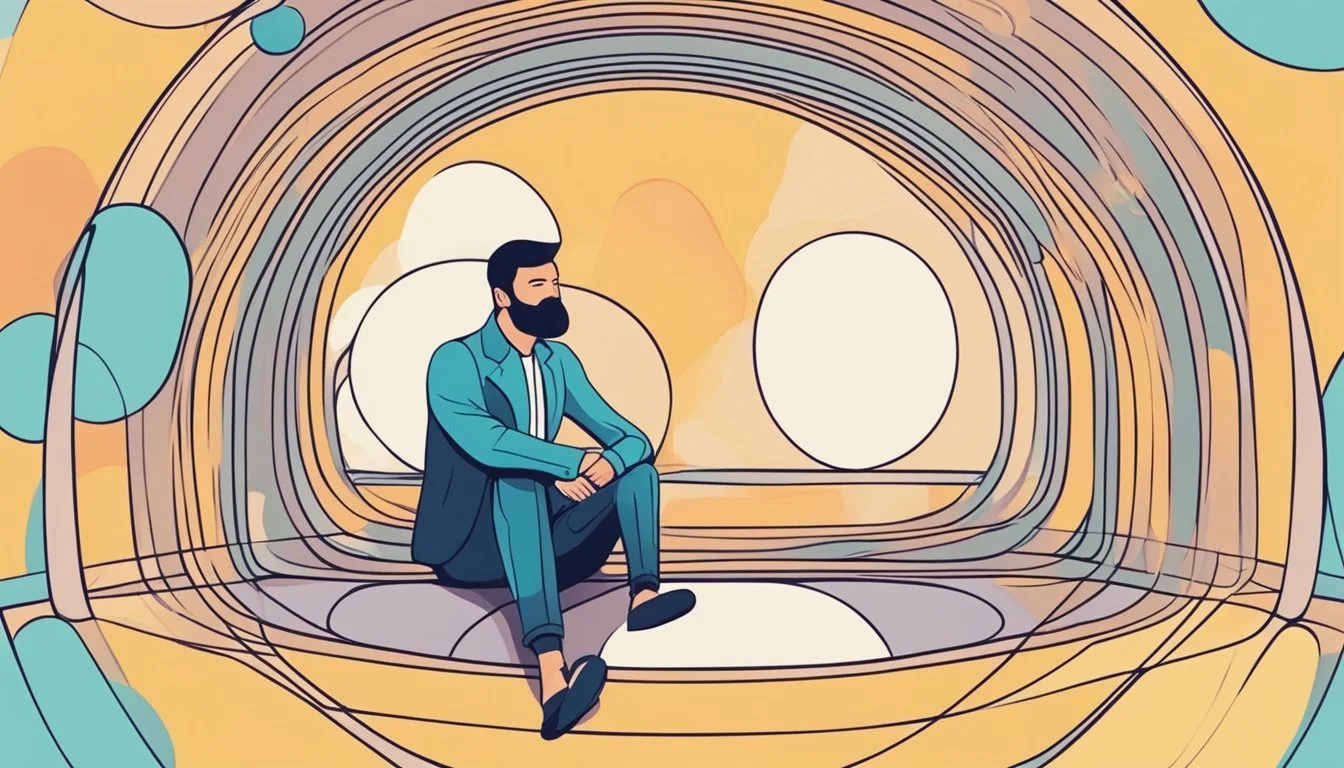12 Characteristics of Emotionally Unavailable Individuals
Understanding the Signs
Understanding the traits of emotionally unavailable individuals can significantly improve one's relational experiences. This knowledge is valuable not only for identifying such traits in others but also for introspection and personal growth.
Recognizing emotional unavailability empowers people to make informed decisions about their relationships. By being aware of these characteristics, one can navigate personal and professional relationships more effectively, ensuring healthier and more fulfilling connections.
1) Avoids Deep Conversations
Emotionally unavailable individuals often avoid deep conversations. They steer clear of discussing emotions or personal topics. This helps them maintain a distance in relationships.
They may stick to surface-level topics like work or hobbies. This prevents any emotional vulnerability. They rarely engage in meaningful discussions about feelings or relationship goals.
Their discomfort with emotional intimacy can be apparent. They might change the subject when emotions arise. Or they may become aloof and unresponsive.
For example, when asked about their feelings, they might give vague responses. This lack of engagement can create a sense of disconnection. Partners might feel frustrated or overlooked. They may sense a reluctance to share on a deeper level. In such cases, it's crucial to recognize these behaviors. Identifying these signs can help in understanding emotional availability.
To read more on emotional unavailability, check out this article.
2) Rarely Shows Affection
Emotionally unavailable individuals often struggle with expressing affection. This manifests as a limited display of physical or verbal expressions of warmth and love. Their interactions may feel distant and impersonal, which can leave their partners feeling unappreciated and unloved.
These individuals might avoid physical touch or affectionate gestures like hugging or holding hands. They may also refrain from using affectionate language or compliments.
Their reluctance to show affection can stem from a fear of vulnerability or being hurt. This emotional barrier creates a significant gap, making it difficult for them to form deep, meaningful connections with others.
In relationships, their lack of affection can be misinterpreted as indifference or lack of interest. This can lead to misunderstandings and feelings of rejection among their partners.
Emotionally unavailable people may not recognize the importance of affection in maintaining healthy relationships. This absence of affection can be a key indicator of their emotional unavailability.
3) Cancels Plans Frequently
Emotionally unavailable individuals often cancel plans at the last minute. This behavior creates a sense of unpredictability and instability in their relationships. It leaves others feeling unimportant or undervalued.
Frequent cancellations can be a defense mechanism to avoid emotional intimacy. By not committing to plans, they can maintain emotional distance. This helps them avoid potential discomfort or vulnerability.
This pattern can also be linked to an underlying fear of attachment. If they're not present, they don't have to engage deeply. This avoidance can prevent meaningful connections, making relationships shallow and short-lived.
This behavior may extend to both romantic and platonic relationships. Friends and partners may find it challenging to rely on them. It often leads to frustration and confusion for those involved.
For more detailed information, you can explore articles that outline signs of emotional unavailability and their impact on relationships.
4) Keeps Conversations Surface Level
Emotionally unavailable individuals often keep conversations at a superficial level. They avoid deeper discussions about feelings, thoughts, and personal experiences.
Their communication usually revolves around trivial subjects such as weather, work, or entertainment.
This behavior stems from a reluctance to become vulnerable and share personal insights. By keeping conversations surface-level, they maintain an emotional distance from others.
In relationships, this can create a barrier to forming a meaningful connection. Their partners or friends may feel frustrated by the lack of genuine communication and intimacy. The lack of depth in conversations can prevent the development of trust and closeness.
Emotionally unavailable individuals might use humor or distraction to steer conversations away from serious topics. This can lead to feelings of isolation and misunderstanding among those trying to connect with them. Persistent surface-level conversations can be a sign of emotional unavailability, affecting personal and professional relationships alike.
People around them may not even realize the emotional gaps immediately, attributing the superficial talk to personality rather than emotional avoidance. Noteworthy is that this avoidance can be linked to various causes, such as past trauma or fear of rejection.
5) Deflects Personal Questions
Emotionally unavailable individuals often deflect personal questions to avoid vulnerability. This behavior can be a defense mechanism developed to protect themselves from emotional pain or discomfort.
When asked about their feelings or personal experiences, they might change the subject. This redirection serves to steer the conversation away from topics that require emotional openness.
Another tactic they use involves giving vague or non-specific answers. Instead of directly addressing a personal question, they might respond with general statements or shift focus to something else entirely.
In conversations, they might turn questions back on the asker. For example, if asked about their feelings, they might reply with, "Why do you ask?" or "What about you?" This helps them avoid sharing their own emotions.
These avoidance techniques can be frustrating for those trying to establish a deeper connection. Emotional intimacy requires honesty and openness, and deflecting personal questions is a barrier to building such intimacy. To learn more about signs of emotional unavailability, you can visit Choosing Therapy.
Through these behaviors, emotionally unavailable individuals maintain an emotional distance. Understanding this tendency can help in recognizing and addressing relationship challenges.
Lacks Empathy in Situations
Emotionally unavailable individuals typically struggle to exhibit empathy in various situations. They may find it challenging to connect with others' emotions and can seem indifferent or detached.
This lack of empathy often results in an inability to provide emotional support. During times of distress, they might offer logical solutions instead of understanding the emotional needs of those involved.
Furthermore, they tend to avoid discussing feelings, which can lead to misunderstandings and strained relationships. Their focus is more on factual aspects rather than emotional elements of a situation.
People who lack empathy might also dismiss or downplay the emotions of others. This behavior can make their partners or friends feel invalidated or misunderstood.
An aloof demeanor often accompanies this trait as they may not fully grasp how their actions impact others. This indifference can create emotional distance and prevent the development of close, meaningful relationships. For more information, visit Verywell Mind.
The struggle to relate to others' emotions is a significant marker of emotional unavailability. Understanding this tendency can help in recognizing the challenges in forming deep emotional connections.
Emotionally unavailable people often redirect conversations to avoid discussing their feelings. This can further distance them from others and erode the foundation of mutual emotional understanding.
7) Often Unavailable Emotionally
Emotionally unavailable individuals often show a pattern of being distant and detached. They may struggle to engage deeply and avoid discussing emotions, making it difficult for others to connect with them on an emotional level.
In relationships, they tend to keep interactions superficial. They avoid intimate conversations and deflect emotionally charged discussions.
They frequently exhibit an indifferent or aloof demeanor. This creates a sense of distance and prevents others from feeling truly close to them.
Their tendency to redirect conversations back to less personal topics can be frustrating. This makes meaningful emotional exchange rare.
This behavior might stem from an underlying fear of vulnerability. Their past experiences may have conditioned them to avoid emotional exposure to prevent getting hurt.
Emotionally unavailable people often prefer solitude. They might frequently withdraw from social situations to avoid emotional interactions.
Understanding the traits of emotional unavailability can help in recognizing and addressing it in relationships. This awareness can lead to healthier interactions and improved emotional connections.
8) Struggles with Commitment
Emotionally unavailable individuals often have difficulty committing to relationships. This is typically due to a fear of vulnerability and getting hurt. They may avoid taking significant steps, such as moving in together or making future plans.
These individuals might exhibit a pattern of short-lived relationships. They often end connections at the first sign of conflict rather than working through issues. This behavior reflects an avoidance of emotional depth and intimacy.
Another sign is the reluctance to label relationships or define boundaries. They resist discussions about exclusivity or the future, leading to ambiguity and confusion. This can be frustrating for partners who seek clarity and a strong commitment.
Even in friendships, emotionally unavailable people may struggle to form lasting bonds. They can be evasive and non-committal, often appearing distant or disconnected. Their fear of emotional intimacy can prevent them from developing meaningful and sustained relationships.
This avoidance of commitment is a defense mechanism to protect themselves from potential pain or disappointment. By maintaining an emotional distance, they believe they can avoid being hurt. This reluctance to commit can significantly impact their relationships, leading to a cycle of brief and unfulfilling connections. For further reading on emotional unavailability, visit Choosing Therapy.
9) Prefers Casual Relationships
Emotionally unavailable individuals often prefer casual relationships over committed ones. They might avoid deeper emotional connections and prioritize short-term interactions.
Casual relationships allow them to maintain a sense of independence. This can help them avoid the vulnerability that comes with emotional intimacy.
These individuals are likely to seek out partners who are similarly uninterested in deep emotional bonds. Such relationships align with their discomfort in engaging with their own and others' emotions.
They might also engage in casual sex as a way to feel connected without the responsibilities of a relationship. Emotional detachment characterizes their interactions, often leading to relationships that lack depth.
For more insights into this behavior, you can refer to the article on emotionally unavailable partners.
10) Feels Suffocated By Intimacy
Emotionally unavailable individuals often feel suffocated by intimacy. This discomfort with closeness can stem from a fear of vulnerability or being hurt. They may withdraw or distance themselves when their partner seeks emotional closeness.
They struggle to maintain emotional connections. Avoiding deep conversations and evading discussions about feelings are common behaviors. This avoidance keeps them from forming stronger emotional bonds.
Their aversion to intimacy might also manifest as a need for excessive independence. They prioritize personal space and autonomy over shared experiences and emotional closeness with their partners.
Experiencing intimacy as overwhelming is a defining characteristic. These individuals might react to emotional demands with irritation or frustration. Maintaining a sense of control by limiting emotional exposure becomes their coping mechanism.
Their relationships can suffer because of this tendency. Partners may feel neglected or unvalued due to the lack of emotional engagement. This dynamic can lead to misunderstandings and strained relationships.
For more information on emotionally unavailable individuals, visit Mind Help's article on this issue.
11) Has Few Long Term Relationships
Emotionally unavailable individuals often have difficulty maintaining long term relationships. They struggle to form deep and meaningful connections with others, leading to short-lived relationships. This pattern makes it challenging for them to establish lasting bonds.
They may appear distant or aloof, avoiding emotional intimacy. Their reluctance to engage deeply can prevent relationships from progressing beyond initial stages. Trust and vulnerability, essential for long-term relationships, are often lacking.
They tend to focus on the immediate, avoiding discussions about the future or long-term plans. This avoidance can create instability and uncertainty in relationships. Their partners may feel unfulfilled and disconnected.
While they might engage in numerous short-term relationships, they rarely commit to long-term involvement. The fear of being hurt or exposing their vulnerabilities can keep them at an emotional distance.
In social settings, they may appear charming and engaging, but in private, they withdraw. This behavior creates difficulty in sustaining long-term relationships, as consistency and emotional presence are necessary components. As a result, their relationships often end prematurely, leaving both parties unsatisfied.
Recognizing this characteristic can be crucial in understanding their behavior. By acknowledging their tendency to avoid long-term commitments, it becomes easier to address and work through the underlying issues.
12) Shows Little Interest in Partner's Life
An emotionally unavailable individual often demonstrates limited curiosity about their partner's activities, interests, or feelings. This lack of interest can manifest in minimal engagement during conversations and a tendency to remain aloof.
Rather than asking questions or showing enthusiasm, they might appear distracted or dismissive. Their responses are usually brief, and they rarely dive deeper into the topic.
They may fail to remember significant events or details shared by their partner. This can make their partner feel unimportant or undervalued.
Instead of participating in shared experiences, they often prefer solitary activities. This withdrawal fosters emotional distance and hinders the development of a close bond.
This behavior is consistent with characteristics observed in emotionally unavailable people, as highlighted by Psychology Today.
Addressing this issue requires recognizing the pattern and working toward more active, empathetic engagement in the relationship.
Understanding Emotional Unavailability
Emotional unavailability can impact relationships significantly. Understanding its definition, causes, and common misconceptions allows for better navigation of personal and professional relationships.
Definition and Causes
Emotional unavailability refers to the inability to form deep, meaningful emotional connections. This may manifest as a distant or detached demeanor. Individuals may struggle to understand or relate to others' feelings, often avoiding emotional conversations.
Several factors contribute to this behavior. Childhood experiences, such as growing up with emotionally distant parents, can deeply affect someone’s ability to connect emotionally in adulthood. Additionally, trauma and past relationship failures can lead to a protective mechanism where they guard against vulnerability by staying detached.
Mental health issues, including depression and anxiety, can also play a critical role. These conditions may make it challenging for individuals to express or even recognize their emotions. In some cases, societal or cultural norms that discourage emotional expression can perpetuate emotional unavailability.
Common Misconceptions
A common misconception is that emotionally unavailable individuals do not care about others. This is not necessarily true. They may care deeply but lack the skills or confidence to express their emotions effectively.
Another myth is that emotional unavailability is a permanent state. Many emotionally unavailable individuals can learn to open up through therapy, personal development, and supportive relationships. It is incorrect to assume that this trait is a choice or a sign of weakness.
Additionally, people often mistakenly believe that emotional unavailability means being introverted or shy. While there can be overlap, the core issue in emotional unavailability is the avoidance of emotional closeness, not simply a preference for solitude.
Addressing these misconceptions can foster a more empathetic understanding of those who struggle with forming emotional connections.
Impact of Emotional Unavailability on Relationships
Emotional unavailability can significantly hinder the development of meaningful connections and emotional intimacy between partners. This section explores the observable signs in relationships and the emotional impact on those involved.
Signs in a Relationship
Partners of emotionally unavailable individuals often notice a distant, aloof demeanor. Communication about feelings might be minimal, leading to misunderstandings. These individuals might prioritize material success and social status over emotional bonds. This lack of emotional intimacy can manifest in avoidance and detachment, creating a barrier to genuine connection.
Emotionally unavailable individuals often value independence over interdependence. They may suppress vulnerable emotions, finding it challenging to open up or show vulnerability in relationships. This behavior can exacerbate feelings of isolation and frustration in their partners, who might struggle to maintain a close emotional bond.
Emotional Consequences for Partners
Partners of emotionally unavailable individuals often experience feelings of loneliness and neglect. The constant emotional distance can lead to frustration and a sense of unfulfillment. This lack of connection may also cause anxiety, as partners might feel inadequate or blame themselves for the emotional gap.
Being in a relationship with an emotionally unavailable person can diminish self-esteem over time. The emotional detachment can make partners question their own worth and desirability. This emotional strain can increase stress and potentially lead to mental health issues like depression or anxiety. For more details, see the emotional unavailability article by Verywell Mind or explore strategies to cope with an emotionally unavailable partner.
Addressing and Overcoming Emotional Unavailability
Overcoming emotional unavailability involves self-awareness, personal development, and potentially seeking professional guidance to foster healthier emotional connections and communication skills.
Self-Help Strategies
Emotionally unavailable individuals can start by reflecting on their past experiences and identifying patterns that contribute to their emotional barriers. This self-awareness is crucial for understanding the root causes of their behavior.
Journaling can be an effective tool. Writing down thoughts and feelings helps individuals process emotions and recognize triggers, facilitating better emotional management.
Developing mindfulness practices, such as meditation or deep breathing, can also help regulate emotional responses. These techniques promote self-awareness and reduce stress, making it easier to engage emotionally with others.
Improving communication skills is essential. Learning to express feelings clearly and listen actively can bridge emotional gaps. Seeking self-help books or online resources on effective communication can provide useful guidance.
Establishing healthy boundaries is key. Individuals should work on distinguishing between being open and overextending themselves emotionally. This balance fosters trust and reciprocation in relationships.
When to Seek Professional Help
Professional help becomes necessary when self-help strategies are insufficient or if emotional unavailability significantly hampers personal or professional life. Therapists and counselors offer tailored strategies to address emotional barriers based on individual needs.
Cognitive-behavioral therapy (CBT) is particularly effective. CBT helps individuals reframe negative thought patterns and develop healthier emotional responses.
Attachment-based therapy can be valuable, especially for those whose emotional unavailability stems from childhood experiences. This form of therapy addresses deep-seated attachment issues and promotes healthier relationships.
Group therapy is another option. Sharing experiences in a supportive environment can provide insights and encouragement. Group therapy fosters a sense of community, allowing individuals to practice emotional openness in a safe setting.
Recognizing the signs that indicate professional help is needed is crucial for effective recovery and building meaningful emotional connections.












